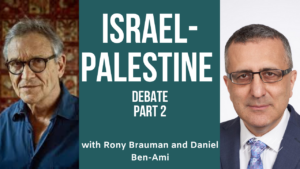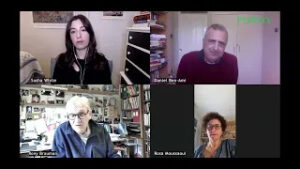In response to: No, Anti-Zionism does not Equal Antisemitism
I appreciate the opportunity to respond to Mark White’s blog in Plebity arguing that anti-Zionism is not antisemitism. I take up some but not all of Mark’s arguments. I agree with Mark that not all anti-Zionism is antisemitism and that it is wrong to treat the two as one and the same. I certainly agree that criticism of Israel is not antisemitism.
But Mark’s analysis is off base both conceptually and factually in several places.
First, while Mark alleges that the mainstream pro-Israel community routinely conflates criticism of Israel with antisemitism, it’s Mark who conflates opposition to criticism of Israel with opposition to criticism of anti-Zionism:
“Many Jews in North America, Europe and elsewhere in the world regularly invoke loyalty to Israel as a defining condition of Jewish identity. These same people typically conflate even mild criticism of Israel with antisemitism.”
The vast majority of mainstream Jewish organizations make it very clear that criticism of Israel and Israeli policies is not antisemitism. The “Working Definition of Antisemitism,” endorsed by nearly every Jewish organization in the world, explicitly states: “Criticism of Israel similar to that leveled against any other country cannot be regarded as antisemitic.” Of course, there are ideologues and shrill voices who conflate the two but as loud as they are these voices are at odds with the overwhelming consensus in the Jewish community.
Let me go further: Criticism of Israel is not anti-Zionism. Anti-Zionism is opposition to Israel’s right to exist as a Jewish state. It’s a very specific stance. Indeed, one can be ferociously critical of Israeli policy and still be an ardent Zionist and even regard anti-Zionism as fundamentally antisemitic. I know many progressive Zionists with precisely such an attitude.
Second, turning to the nub of the issue of whether opposing Israel’s right to exist as a Jewish state is antisemitic, opposing the right of a state to exist is strange. There is no other large-scale effort in the world dedicated to opposing an existing state’s right to exist. I can think of only four categories of people whose anti-Zionism doesn’t seem to be motivated by animus: an anarchist who opposes the existence of all states, Israel included; a religious Jew who believes Israel should only have been reconstituted in a future messianic era; a Palestinian who has been directly impacted by the creation of the state (which doesn’t protect him from the charge of being antisemitic if he expresses disdain for Jews); and a simpleton who latches on to anti-Zionism as the latest fad but doesn’t really know what it means.
I am personally not preoccupied with the question of whether anti-Zionism is a form of antisemitism. Nevertheless, I am at a loss for explaining the obsession with Israel’s existence and no other state’s. Forget individual cases and exceptions for a minute. What else explains the singular push to extinguish the Jewish state whose majority population manifestly does not want to cease existing in a state?
Third, Mark misses the boat on the demographic argument. He states:
“Even back then it was clear that the demographic reality of the huge and growing Arab population put Israel on a collision course with its self image as a democracy. With a disenfranchised and ever-expanding minority non-Jewish population, Israel could be a Jewish state but could not also claim to be a true democracy.”
In Israel proper, at least, there is no demographic collision course. Israel’s Palestinian population is around 20% and its Jewish population is 75%. The Jewish birthrate in Israel is approximately 2%, which is extremely high for a democratic country. The Palestinian Israeli population shows no sign of overtaking the Jewish population in Israel proper. As for outside the “Greenline,” there are 2.7 Million Palestinians in the West Bank and 2 Million in Gaza. Notwithstanding the state of hostility between Israel and the Hamas controlled ministate in Gaza, the Palestinians in Gaza are not occupied by Israel, as the UN itself certified when Israel pulled out in 2005. Gaza shares a border with Egypt and is thus not completely at Israel’s mercy. In no sense is the Palestinian population in Gaza on a collision course with the Jewish population in Israel. It constitutes an entirely separate polity.
What about the Palestinians of the West Bank? Even if all the Palestinians in Israel and the West Bank voted as a single block in future Israeli elections, they still would not come close to voting out of existence a Jewish state any time soon. If Israel annexes the West Bank (which I strongly oppose), it would take decades and may not happen at all that the Palestinian population would surpass the Jewish population. In any event, it is strange to discredit a nation-state’s democracy because a minority population might someday, under very specific circumstances, exceed the majority in numbers. That’s not to say that Israel shouldn’t try much harder to end the occupation of the West Bank. It should. But we should also recognize that extricating itself from the West Bank is highly complicated both for reasons of Israel’s own making and for the continued rejection of a feasible Palestinian state by Palestinian leaders. In the meantime, there is nothing in the current situation that makes Israel anything but a democracy in its own sovereign state.
Mark goes on to say:
“This reality of an excluded, second-class population leads to a legitimate claim that Israel is an Apartheid state. There is no logical way to reconcile the claim that Israel must remain Jewish while at the same time lauding it as the only true democracy in the region.”
Again, It’s not clear here if Mark is speaking of the Israeli Arabs or the Palestinians in the West Bank or is just conflating the two. The Israeli Arab population is the only population of Arabs in the Middle East that can vote in genuine democratic elections. To be sure, their lot is far from perfect, though it has substantially improved in the past 15 years. Large majorities of Palestinian Israelis say they would rather live in Israel than a future Palestinian state. Christian Arab citizens of Israel are both wealthier and better educated on average than Jewish Israelis. Still, Israel can and should do better by its own citizens. It’s hard to argue, however, that Palestinians would be freer if Israel ceased existing as a Jewish state or even if they lived in a state of their own, which I fervently hope they get one day. There is no reason to believe that extinguishing a Jewish state and replacing it with a single state (which 99% of Jewish Israelis say they oppose) would be more democratic or constitute a more humane society than Israel. Indeed, there is every reason to believe such a state, whose Jewish population would abandon, would just devolve into another autocratic Arab regime in the region.
Anti-Zionism may or may not be antisemitism, but it is surely an absurd idea.
Finally, Mark argues that contemporary Jewish identity need not place a premium on Israel. I couldn’t agree more. Jews are a diverse people, and that diversity is a strength and not a weakness. Likewise, diversity of thought is a hallmark of Jewish life. It helps no one to callously define others out of the conversation. Jews and society at large need more, not less, dialogue and discussion.




